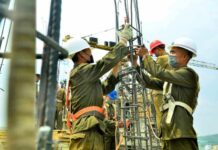Recently, North Korean farmers have expressed dissatisfaction with the format and content of study sessions focused on the “Juche Farming Method.” A source in North Korea recently told Daily NK that “the sessions focus on inspiring loyalty to the Workers’ Party and the Supreme Leader, instead of providing farmers with practical agricultural skills and experience.”
The instructors, sent by provincial rural accounting committees and county-level agricultural cooperative management committees, claim that agriculture is managed scientifically based on the analysis of the previous year’s crop production. However, they have given priority to emphasizing patriotism and loyalty in the study sessions. There is little information on methods of mitigating climate change or measures to increase the yield of crops per jongboA unit of measure commonly used to measure the size of land ... More. Farmers have responded by saying: “If this is what they are going to say to us, it’d be better to just hold criticism sessions rather than study meetings.”
Study meetings on the Juche Farming Method are held annually at the beginning of each year. The management committees of the urban agricultural cooperatives first draw up curricula for each sub-sector: agriculture, animal husbandry, irrigation, pomiculture, vegetation, and handicrafts. The committees then bring together primary-level leaders such as farm managers, work team leaders, and sub-work team leaders to train them. In turn, the primary level managers teach the farmers they supervise what they have learned. The sessions were created after the Workers’ Party criticized experience-based farming as “clumsy.” Although they have continued for more than fifty years, the sessions do not seem to have produced positive results.
The reason is that the central government sets the curricula for the sessions, which are neither specific nor diverse because they do not reflect regional characteristics. Farmers dislike the sessions because they have become another political tool for the Workers’ Party to impose ideological education.
North Korea acknowledges the fact that agricultural production has declined and a food crisis persists. But is this the result of farmers’ lack of loyalty?
North Korea’s food self-sufficiency rate is 78.2%, but productivity has been steadily declining. This is due to irrational resource allocation, inflexible agricultural management and distribution policies, and the dilapidated state of the country’s agricultural infrastructure. The state’s response to the decline in agricultural productivity has been based on the principle of self-reliance, including an emphasis on planting and producing at the right time and place, improving irrigation, expanding electrification, increasing the use of machinery, and making the use of chemical fertilizers universal.
However, the fundamental reason for the steady decline in agricultural production is that the Workers’ Party is focused on maintaining its power over the country. That is why the peasants do not trust the meetings on the Juche Farming Method.
So what should be the purpose of the meetings? They should focus on providing information on how investment and agricultural policies can increase farmers’ income and improve their living conditions. The Workers’ Party should understand that the farmers would not be dissatisfied in the first place if the education were aimed at truly helping them.
Translator requested anonymity. Edited by Robert Lauler.
Daily NK works with a network of sources living in North Korea, China, and elsewhere. Their identities remain anonymous for security reasons. For more information about Daily NK’s network of reporting partners and information-gathering activities, please visit our FAQ page here.
Please send any comments or questions about this article to dailynkenglish@uni-media.net.


















